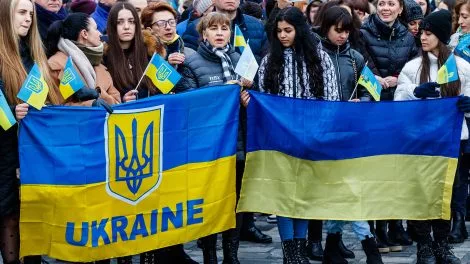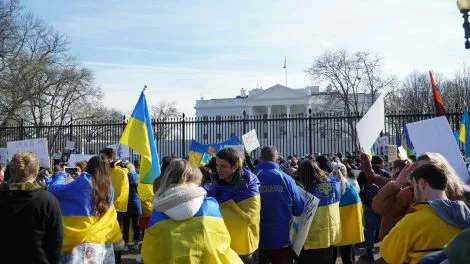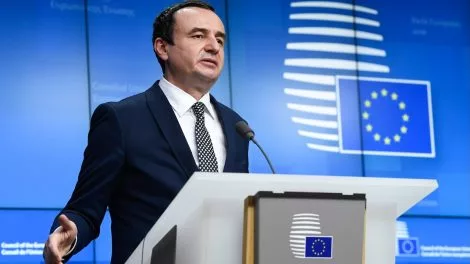At the height of the Cold War, the Ukrainian diaspora played an active role in influencing public opinion regarding the Soviet Union. What is seldom mentioned is the role that Ukrainian evangelicals played in this period. One Ukrainian Baptist convention has not forgotten its history and continues the previous generations’ legacy today.
The Seventh World Congress of the International Council of Christian Churches gathered in Cape May, New Jersey from August 14 to 24, 1968. Arriving at the event were 3,000 delegates from 85 countries. Although a fundamentalist group, this gathering attracted international attention. The delegates were greeted by telegrams from President Lyndon B. Johnson, the Governor of New Jersey Richard Hughes, and even the President of the Republic of China.
- No, Ukraine’s president hasn’t banned the Orthodox Church
- Are Easter differences ‘relics of the Cold War’?
- No more restraint. It is time for NATO to back Ukraine’s offensive
Olexa Harbuziuk, the president of the Ukrainian Evangelical Baptist Convention in the US (UEBC), was the speaker on August 22. Standing at the podium, Harbuziuk denounced the Soviet government, calling it an ‘evil tyranny’ and ‘imperialist’. He emphasised that it is because of the communist system that the Ukrainian people and religious freedom are being suppressed. Yet, it is the suppressed that are the strongest in the dystopian state, “those with more courage and deeper convictions are laying their lives for the truth and openly oppose godless communism”.
Following the speech, a resolution was drafted criticising the Soviet government, calling for worldwide isolation of the USSR and its expulsion from the United Nations. The statement concluded by identifying with the persecuted and supporting the “urgent appeal of the Ukrainian Evangelical Baptist Convention to the entire Christian world to pray for and to work for the liberation of all peoples from Communist tyranny”. It was through the UEBC that the entire world was able to hear of the suffering in the USSR.
Within the Ukrainian Baptist diaspora, Harbuziuk was not the only one to speak about the horrid religious circumstances in the USSR. This was a common thread of many Ukrainian-American evangelical leaders. Megaphoning the suffering of the oppressed was part of their religious calling. Yet, this legacy did not die with that generation. In light of Russia’s annexation of Crimea and its full-scale invasion of Ukraine, many Baptist leaders are once again speaking out on behalf of Ukrainian suffering.
Continuing this tradition of advocacy, Roman Kapran, the president of the Ukrainian Baptist Convention in the US (UEBC), emphasises the active role their churches have played from the outset.
“Our churches have been very active from the beginning,” states Kapran. He notes that at the start of the war, a prayer service was held at the Museum of Art in Philadelphia. Hundreds attended, including church leaders from all backgrounds, Protestant, Greek Catholic, and Ukrainian Orthodox. He continued by stating that other Ukrainian Baptist churches around the US, “came with Ukrainian flags and held open-air prayers” in their states.
In addition to prayer services, the convention leaders penned a public letter denouncing Russia’s aggression. Although the Ukrainian Baptist Convention is small—roughly 20 affiliated churches —their actions reflect a continuation of the mission established by their predecessors: to stand up for Ukraine and support those in need. These actions not only show the UEBC’s commitment to advocacy but also serve as a direct link to the foundational mission established by its early leaders over seventy years ago.
Lived experience
The UEBC was originally founded in 1946 by six ministers of Polish and Ukrainian heritage. Their goal was to reach the Ukrainian diaspora in the United States and to support persecuted Christians in Ukraine.
After WWII, a new wave of immigrants arrived from Ukraine to the United States. They carried with them the lived experience of Holodomor, Soviet purges, and the horrors of World War II. Many of these third-wave immigrants were Ukrainian nationalists who had fought for an independent Ukraine during the war, only to be suppressed by both the Nazis and the Soviets.
Expecting a large group of immigrants after the war, the convention creators desired to evangelise and support them materially.
The secondary mission of evangelicals was to speak about the suffering of the Christians in their former homeland. During the Soviet era, evangelical churches were viewed with suspicion by Russian authorities. They saw them as foreign imports lacking patriotic fervor. This suspicion led to severe persecution, with evangelicals often labeled as spies and revolutionaries. The diaspora did not forget them. Instead, they amplified the oppressed voices using radio broadcasting and public advocacy.
Radio broadcasting was the main method used by Christians to minister to individuals in oppressive regimes. As historian Lauren Frances Turek notes in her book To Bring the Good News to All Nations, starting in the 1970s, evangelicals began mastering their use of technology “to fulfill their mission of sharing the gospel with all people of the world”. Ukrainian and Slavic evangelicals were at the forefront of using these technologies.
The radio network in Chicago, Slavic Gospel Association (SGA), was commonly heard throughout the Soviet Union. Peter Deyneka, a Belorussian, started the programme in 1934. Despite not being a member of the UEBC, his organization played an important role in airing religious material into the USSR. According to Turek, SGA was a “steadfast advocate for believers behind the Iron Curtain who were suffering from state persecution”.
Famously, they aired a letter from a dissident Ukrainian Baptist pastor, criticising Soviet religious oppression. Another active voice was Harbuziuk, whose programme, Voice of the Gospel into Ukraine, aired between 1966 and 1993. Although both broadcasts mostly aired religious material, there were plenty of occasions where they spoke of evangelical persecution.
Activism
Activism was another avenue for Ukrainian Baptists to speak on behalf of the suffering church. Ministers such as Iwan Renko and John Bojchuk were part of a seven-week tour around the United States discussing Soviet persecution of Christians in 1957.
As part of this tour, Renko dispelled myths about the Soviet church before the Senate Internal Security Subcommittee and again in 1958. Lev Zabko-Potapowich and his family commonly spoke at the Rotary Club on topics regarding religious rights. Harbuziuk spoke at many conferences, even presented lists of imprisoned Baptists to US diplomat Warren Zimmerman, and discussed religious persecution with Ronald Reagan.
Another powerful voice was Giorgi Vins. Vins was a Baptist pastor who was imprisoned for his faith. He became well known after being involved in a prisoner swap at the initiation of President Jimmy Carter in 1979. After coming to the United States, he received a hearing from the Senate, spoke to multiple presidents, and traveled around the world speaking on behalf of the Soviet church. This activism was later done on a grander scale through his organisation, the “International Representation for the Council of Evangelical Baptist Church of the Soviet Union”.
The efforts of the older generation are not forgotten but are revered. Kapran notes, “because of the old immigrants, it became possible for Christians to arrive [to the United States] in the nineties.”
Their role in influencing public opinion manifested itself in stronger policies against the USSR which culminated in liberating the church from Soviet oppression. Their past actions set the standard for the current diaspora and are guiding them in their fight for the current liberation of Ukraine and human rights.
Advocacy
Much has changed for UEBC since the collapse of the Soviet Union. The older generation has passed away and a new group of leaders have been filling their shoes. They have been actively helping Ukraine since its independence and enlarged their support after the Russian full-scale invasion. This has been done through providing humanitarian aid and advocacy.
Humanitarian aid has been the UEBC’s primary method of helping Ukraine. Kapran notes that since the beginning of the invasion, they have raised over 500,000 US dollars and delivered multiple containers of aid to Ukraine.
Furthermore, aid was provided to Ukrainian refugees at both the Ukrainian-Romanian and the Mexican-American borders. Individuals like Rev. Peter Ivanov, pastor of the Ukrainian Baptist Church of Berwyn, have also played a key role, organizing a community donation drive to assist refuges. These efforts continue through organisations such as World Relief and Save a Life International.
Another avenue to help Ukraine has been political advocacy. Just as Harbuziuk spoke out against religious persecution and Russian imperialism, so are the current leaders. Through local media interviews, public engagements and official statements, the church representatives speak out about the persecution of Ukrainian Christians and the ongoing war.
Likewise, according to Kapran, over a thousand letters, emails, and phone calls, by members of the convention, were made to government officials regarding the latest Ukrainian aid package.
On his end, Kapran has been actively advocating for Ukrainian Christians. Even before the full-scale invasion, he raised concerns about Ukrainian Christian persecution. Since then, he has advocated for the passage of the Ukrainian aid package and is actively involved with the broader Ukrainian diaspora.
Yet for Kapran, the most important message to convey is that “in the occupied territories, there is a total persecution of Ukrainian Christians…this too needs to be talked and written about.”
Olexa Harbuziuk passed away on October 4, 1997, but the legacy he and his contemporaries left, endures. “People need to know our earlier history,” Kapran emphasises, “our Ukrainian diaspora was very active… they very clearly spoke out.” This history may be unknown to many within the Ukrainian diaspora, but the Ukrainian Evangelical Baptist Convention kept it alive.
Today, a new generation of leaders has taken up the baton, continuing the advocacy for both Christians and Ukraine, building on the legacy of their predecessors.
Unlike many news and information platforms, Emerging Europe is free to read, and always will be. There is no paywall here. We are independent, not affiliated with nor representing any political party or business organisation. We want the very best for emerging Europe, nothing more, nothing less. Your support will help us continue to spread the word about this amazing region.
You can contribute here. Thank you.

Published by: emerging-europe.com





